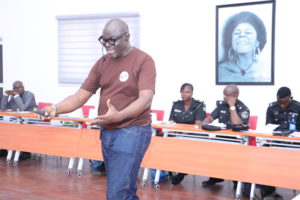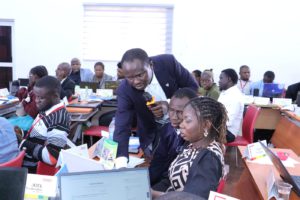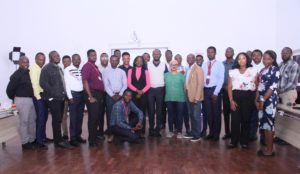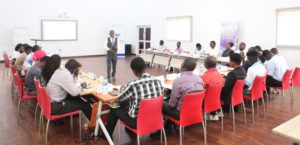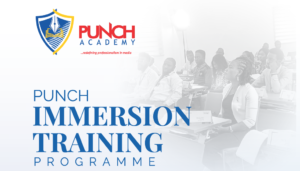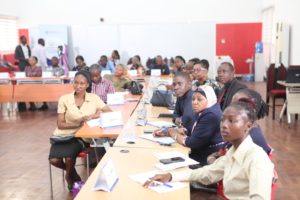The second week of the PUNCH Immersion Training Programme (PITP) opened with a reflective recap of the first week. Participants shared their excitement about the insights gained and pledged to apply the lessons learnt in their professional work.
Among the participants who spoke was Olawale Akinselure. He noted that although he had prior experience in journalism, the training not only enlightened him but also re-energised his passion for the craft. Similarly, Zakariyau Abdulrahan, who joined remotely from Abuja, highlighted the session on exclusive reporting as a standout, adding that he now understands why editors place such high value on exclusives.
Building on this momentum, the focus shifted to niche reporting, which was the focus of the sixth and seventh day of PITP 2025. To set the tone, Mr. Sesan Olufowobi, Editor of Theeditorial.ng and former News Editor at PUNCH, delivered a comprehensive session on the Fundamentals of Beat Reporting. He walked participants through the definitions, benefits, uniqueness, and methods of beat reporting. When Imoleayo Oyedeyi raised a concern about gathering visual evidence in risky environments, Olufowobi emphasised that while no story is worth a reporter’s life, technology and strategy can help mitigate danger.
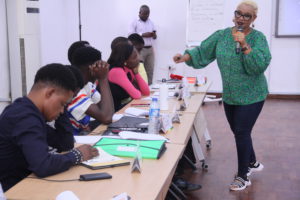
The exploration of specialised beats continued with Metro Reporting 101, facilitated by Mrs. Juliana Francis. She explained that metro beats often overlap with areas such as the judiciary, corrections, disaster response, and entertainment. Stressing that metro stories are largely news features, she reminded participants to always adhere to the 4Ws and H of reporting.
Following the session on metro reporting, the training progressed to education reporting, facilitated by Mr. Segun Olugbile, a school administrator and acclaimed education journalist. Emphasising the value of versatility and a positive outlook, Olugbile stressed that a journalist’s mindset significantly shapes their influence and effectiveness. He provided a comprehensive list of key stakeholders in the education sector and urged participants to engage with all of them, and beyond, to ensure inclusive and well-rounded coverage of education-related issues.
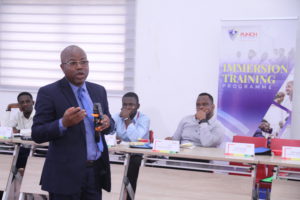
The theme of political awareness took centre stage in the session on Politics and Governance Reporting, led by Mr. Lekan Adetayo, Editor of PUNCH Digital. Drawing on his extensive experience, including coverage of the Nigerian presidency, he stressed the importance of understanding political language and context. A lack of familiarity, he warned, could result in avoidable errors. He encouraged participants to embrace curiosity and close attention to detail as tools for generating exclusive stories.
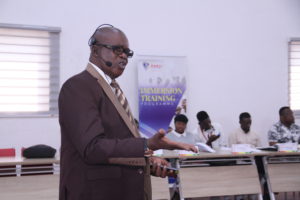
Turning to the world of sports, Mr. Adekunle Salami, Vice President of the Guild of Sports Editors, delved into the nuances of Sports Reporting. He underscored the need to master sport-specific terms and be well-versed in relevant statistics and historical records. In response to Abe Oluwaseyi’s question about football’s dominance, Salami challenged participants to spotlight other sports by crafting engaging and relatable stories.
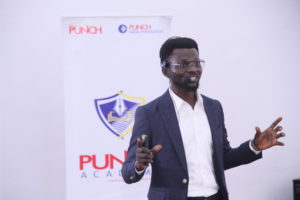
The focus then shifted to the business desk with Mr. Femi Asu, former Assistant Business Editor at PUNCH, who opened his session by exploring participants’ perceptions of business news. While Jide Ajia appreciated the clarity that infographics bring, Wale Akinselure admitted he found stock exchange reports off-putting. Asu demystified business reporting as the art of simplifying complex financial issues and stressed the importance of accuracy, simplicity, clarity, and context.
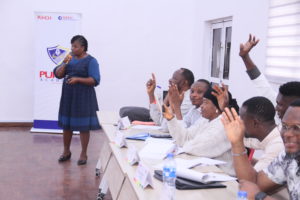
This clarity of expression was further reinforced in a session on Health Reporting, where Mrs. Angela Onwuzoo, Editor of PUNCH HealthWise, presented a holistic view of the beat. She emphasised the goal of helping society lead healthier lives and outlined key areas in the beat, including public health, mental health, maternal and child health, WASH, and nutrition. She also cautioned that credible health stories must be grounded in science and updated knowledge, not hearsay.
As digital transformation reshapes journalism, the ethical use of Artificial Intelligence was a recurring topic throughout the programme. Mrs. Flourish Ubanyi, West Africa Bureau Chief at DW, expressed concern over AI-induced misinformation and stressed the journalist’s duty to prioritise verification over speed. Complementing this, Mr. Mayowa Tijani of the Cable Newspaper Journalism Foundation and Mr. Kirk Leigh, Editor-in-Chief of Abuja Politico, offered practical strategies for using AI tools in meaningful and impactful reporting.
Participants also gained hands-on knowledge in Writing for Digital Platforms, led by Mr. John Abayomi, Founder of Virals.NG. He encouraged participants to stay ahead of the competition in a saturated digital media space. His insights were complemented by Mr. Lanre Balogun, former Chief Digital Analyst at PUNCH Digital, who spoke on SEO and content development. Ms. Kemi Abimbola, Chief Correspondent at PUNCH, added perspective on the critical role of social media in shaping the practice of journalism.
A shift in tone marked the segment on Investigative Journalism, led by Mr. Fisayo Soyombo, Founder of the Foundation for Investigative Journalism. He dispelled the notion of shortcuts, asserting that excellence comes only through sustained effort. In a related session on interview techniques, Mr. Olumide Iyanda, CEO of Mighty Media Plus Network, emphasised the need for empathy and respect during interviews, which he said leads to more authentic, high-impact content. On the subject of Analysis and Opinion Writing, Mr. Joel Nwokeoma, Editor of PUNCH Metro, made a clear distinction, stating that while opinion is subjective, analysis must be factual and rooted in data.
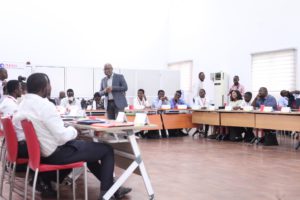
The two-week training concluded with a stirring final session titled Things I Wish All Young Journalists Knew, delivered by Mr. Adeyeye Joseph, Managing Director/Editor-in-Chief of PUNCH Nigeria Limited. Sharing from his professional journey, he spoke about the importance of maintaining a positive and possibility-oriented mindset. He encouraged participants to become “idea-obsessed” and to pursue excellence with consistency. As a practical takeaway, he advised them to read at least two local and one international newspaper daily to broaden their understanding generally and boost their performance as professionals.
The programme ended on a high note, with participants expressing gratitude for what they described as a high-impact, transformative experience. They committed to justifying the substantial investment made by PUNCH’s management, facilitators, and organisers.



